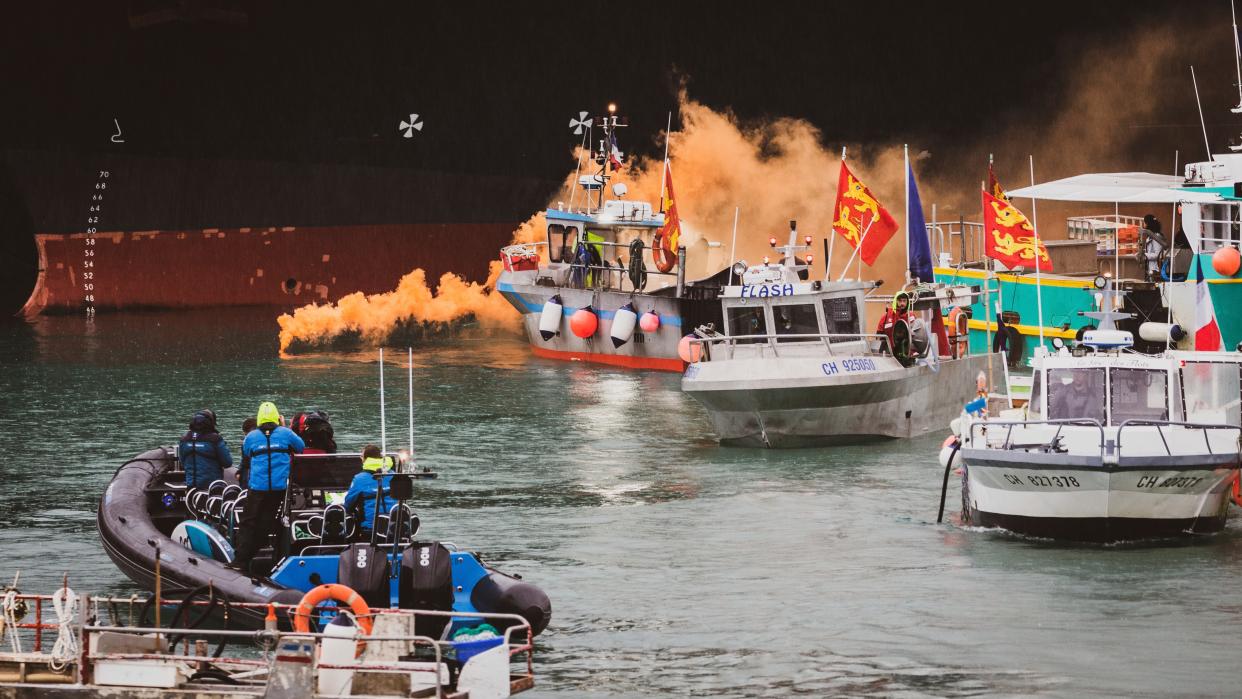The War with France is over – trouble is, the next skirmish with the European Union won’t be so funny

Shortly after dawn, a man from a battle reenactment society went up the ramparts of the Fort Regent in Jersey, put on a tricornered hat and, in the full glare of the gathered news cameras, fired an ancient musket in the direction of a French naval vessel.
This was the beginning and indeed the end, the high and the low point of the War with France. In many ways, it had more going for it than the War with Spain. That one, if you recall, was accidentally declared by Michael Howard from the comfort of his own home, during a Sunday morning television interview with Sky News. Peace between the two nations is commonly understood to have been reestablished before the next commercial break.
It was Peter Cook who once said that Britain will one day “sink giggling into the sea”, possibly paraphrasing George Orwell before him, who had described the UK as “being ruled largely by the old and silly”.
The War with France was an enjoyable enough distraction. Various shipping websites allowed those who are so inclined to track the passage of British and French navy vessels, called into action by a protest by French fishermen over what they consider to be an unfair change to rules regarding the right to fish in the waters around Jersey.
Were the rule changes negligible? Were the French protesters out of line? Was Britain within its rights to seek to break up the apparent blockade with the threat of naval force – not that it would ever actually have used it? Was France really threatening to retaliate by cutting off electricity to the entire island? Could Jersey have just generated its own, had it done so? Did the EU withdrawal agreement give France reason to retaliate in such a way? Who would decide? How long would it take for such a decision to be reached? What was the point of the withdrawal agreement if its arbitration mechanisms took so long to arbitrate that they rendered any kind of rightful retaliation pointless? And wasn’t Jersey not even in the EU anyway?
These are just a selection of the many questions that nobody would ever have thought they would ever have to think about until quite recently. Until, that is, The Triumph of The Fish, which occurred some time toward the end of last year, when all matters pertaining to the economy were demoted to second tier significance, beneath an industry whose entire value is just under that of the pet insurance sector.
Still, the War with France kept people going for a while. The Daily Telegraph had time to point out that, on Jersey, even the Nazis had kept the power on. Nazi occupation remains a difficult subject. It was only two years ago that more mass graves were found there. That there were what amounted to concentration camps on British soil is a delicate subject, and not necessarily a very strong subject for a bit of very glib jingoism, ignited by a slightly odd man with a very odd hat and an actual musket.
Naturally, the tabloid papers can’t get enough of it. The War with Spain, which to state again, existed solely in the form of a single unguarded sentence in a TV interview with a former Tory leader, was sufficient for at least one Sun front page featuring photos of apparently suspicious movement of Spanish gun ships off the coast of Gibraltar.
Does it really matter? Well, trouble is, it doesn’t feel like a passing fad anymore, does it? Or a brief moment of madness. The necessary trickle down effect of a joke prime minister is to become a joke country. Everything can be reduced to the glib, the banal.
But it’s not always all that funny. The decision to realign British interests, to take them out of the realm of compromise and to, by default and by design, set them against a very large and powerful union of all the countries around us has already had consequences.
The European Union made a mess of its vaccine procurement. The UK did not. The EU’s response – though it eventually backed down – was to impose a ban on vaccine exports to the UK, a course of action that amounted to unilaterally imposing controls on goods travelling across the land border in Ireland.
The debate about this, a few months ago, naturally became superheated. The EU’s behaviour was outrageous, and therefore Brexit was great. The EU’s behaviour was, in some ways, outrageous, but it has never been considered outrageous for a country, or a union of countries, to protect their interests.
“Reluctant remain”, really was a thing, five years ago. The idea that, despite the apparent romantic swashbuckling appeal of going it alone, the downsides of every country in Europe being in a single union, except for us, would be massive. It is, for example, legally impossible for the EU to impose an export ban on one of its own members.
The War with France, thankfully, is over. The vaccine storm subsided. But these little flurries of ill feeling, these diplomatic skirmishes, will continue. In Northern Ireland, they are already building to something of a crescendo, though no one is quite sure how loud it has the potential to get.
And not everything can be reduced to simpering laughter, as it is shot at through the dawn by a madman with a musket. When Britain sinks into the sea, it might not actually be giggling all that hard.
Read More
EU says UK is breaking Brexit trade deal amid Jersey fishing row
Facebook, Liz Cheney and the Republican push for an end to democracy in 2024
Nothing says ‘easiest trade deal in history’ quite like gunboats deployed to Jersey

 Yahoo News
Yahoo News 
